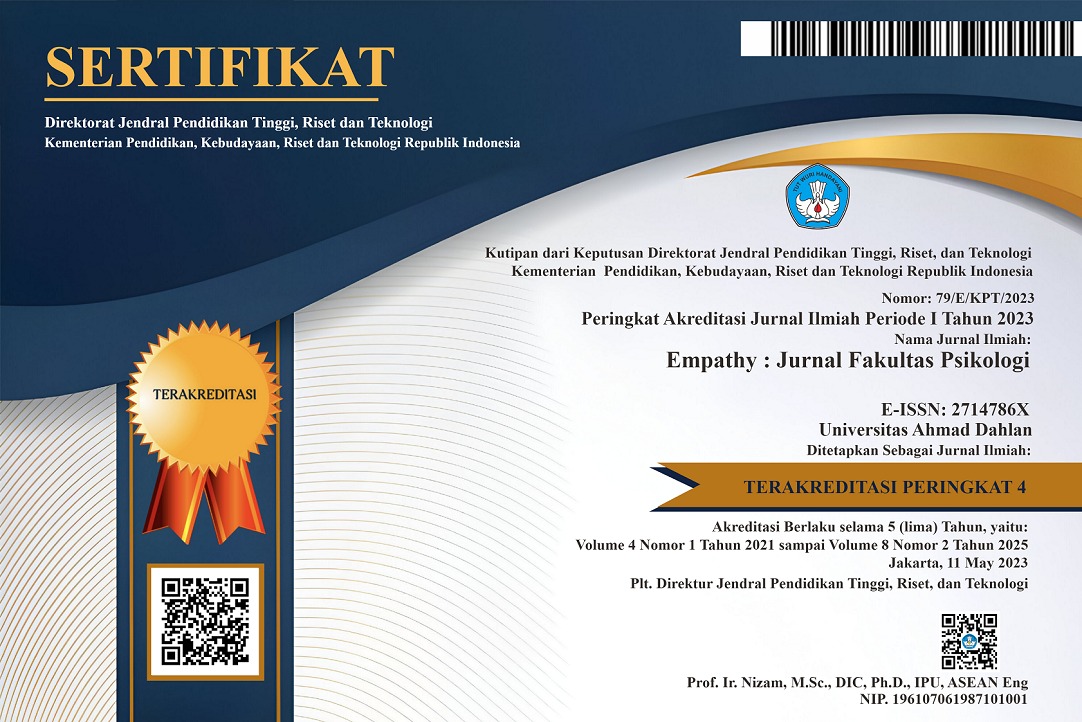The Overview of Final Student Self-Efficacy towards Lectures
DOI:
https://doi.org/10.12928/empathy.v5i2.24454Keywords:
Bandura, lectures, self-efficacy, studentsAbstract
This article aims, first to describe the self-efficacy of final-semester students in lectures based on Albert Bandura's personality theory, second describe the factors that influence the self-efficacy of final students toward lectures based on Albert Bandura's personality theory. This study was qualitative and descriptive. The primary data sources in this study were students’ perceptions of their efficacy. Data collection was conducted through interviews with the final students as research subjects. Validation technique using triangulation. The results of the study, first final semester students have low self-efficacy and high self-confidence, second factors that influence student self-efficacy are lack of experience in mastering something, and social model modeling social persuasion.
References
Amirullah. (2015). Metode & Teknik Menyusun Proposal Penelitian. Malang: Media Nusa Creative.
Ansong, D., Eisensmith, S. R., Okum, M., & Chowa, G. A. (2019). The Importance of Self-Efficacy and Educational Aspirations For Academic Achievement in Resource-Limited Countries: Evidence From Ghana. Journal of Adolescence, 70(1), 13-23. doi.org/10.1016/j.adolescence.2018.11.003
Bandura. (2002). Guide for constructing self-efficacy scales. in Self efficacy beliefs of adolescents, Fajares and T. Urdan, Eds. Greenwich: Information Age Publishing
Bandura, A. (2002). Self-Efficacy: The Exercise of Control. 5th printing. New York: W.H. Freeman and Company.
Bungin, B. (2017). Penelitian Kualitatif: Komunikasi Ekonomi Kebijakan Publik dan Ilmu Sosial Lainnya. Jakarta: Prenada Media Group.
Feist, J., Feist, G. J., & Roberts, T.A. (2018). Teori Kepribadian. Jakarta: Salemba Humanika
Ghufron, M. N. & R. R. S. (2010). Teori-teori psikologi. Yogyakarta: Ar-Ruzz Media
Liu, H., & Pan, X. (2011). The influence of leaders’ hope and self-efficacy on their subjective well-being [In Chinese]. Psychological Exploration, 31, 176–181.
Nan, W. (2018). Empirical Study on the Impact of Creative Self-Efficacy of College Student Entrepreneurs on Innovative Behavior. Science Journal of Business and Management, 6(5), 93-99. doi: 10.11648/j.sjbm.20180605.11
Olivier, E., Archambault, I., Clercq, M. D., & Galand, B. (2018). Student Self-Efficacy, Classroom Engagement, and Academic Achievement: Comparing Three Theoretical Frameworks. Journal of Youth and Adolescence, 1-15. doi.org/10.1007/s10964-018-0952-0
Pachu, N., Strachan, S., McMillan, D., Ripat, J., & Webber, S. (2020). University Students’ Knowledge, Self-Efficacy, Outcome Expectations, and Barriers Related to Reducing Sedentary Behavior: A Qualitative Study. Journal of American College Health, 1-9. DOI:10.1080/07448481.2020.1786098
Rafiola, R. H., Setyosari, P., Radjah, C. L., & Ramli, M. (2020). The Effect of Learning Motivation, Self-Efficacy, and Blended Learning on Students’ Achievement in The Industrial Revolution 4.0. iJET, 15(8), 71-82. doi.org/10.3991/ijet.v15i08.12525
Schunk, D. H., & Mullen, C. A. (2012). Self-efficacy as an engaged learner. In S. L. Christenson, A. L. Reschly, C. Wylie, (eds.) Handbook of research on student engagement. (pp. 219–236). New York, NY: Springer.
Schunk, D. H., & Pajares, F. (2009). Self-efficacy theory. In K. R. Wentzel & A. Wigfield (Eds.), Handbook of motivation at school (pp. 35–54). New York, NY: Routledge.
Sebastian, B. B., Slaten, C. D., Williams, M. S., & Elison, Z. M. (2021). College Student Exercise Motivation: The Role of Belongingness and College Self-Efficacy. International Journal of Contemporary Education, 4(2), 1-11. doi:10.11114/ijce.v4i2.5221
Shen, Z.-F., Yang, X.-M., Sun, X.-Q., He, Q.-G., & Han, B.-X. (2013). Influence of personality and general self-efficacy on medical college students’ subjective well-being [In Chinese]. Chinese Journal of Clinical Psychology, 21, 303–305. doi.org/b8k3
Usman, H., & Akbar, S. (2006). Metodologi Penelitian Sosial. Jakarta: PT. Bumi Aksara.
Yu, Y., & Luo, J. (2018). Dispositional optimism and well-being in college students: self-efficacy as a mediator. Social behavior and personality, 46(5), 783-792. doi.org/10.2224/sbp.6746.
Zimmerman, B. J. (2000). Self-efficacy: an essential motive to learn. Contemporary Educational Psychology, 25(1), 82–91. https://doi.org/10.1006/ceps.1999.1016
Downloads
Published
Issue
Section
License
Authors who publish with Empathy: Jurnal Fakultas Psikologi agree to the following terms:
- Authors retain copyright and grant the journal right of first publication with the work simultaneously licensed under a Creative Commons Attribution License (CC BY-SA 4.0) that allows others to share the work with an acknowledgment of the work's authorship and initial publication in this journal.
- Authors are able to enter into separate, additional contractual arrangements for the non-exclusive distribution of the journal's published version of the work (e.g., post it to an institutional repository or publish it in a book), with an acknowledgment of its initial publication in this journal.
- Authors are permitted and encouraged to post their work online (e.g., in institutional repositories or on their website) prior to and during the submission process, as it can lead to productive exchanges, as well as earlier and greater citation of published work.

This work is licensed under a Creative Commons Attribution-ShareAlike 4.0 International License.



